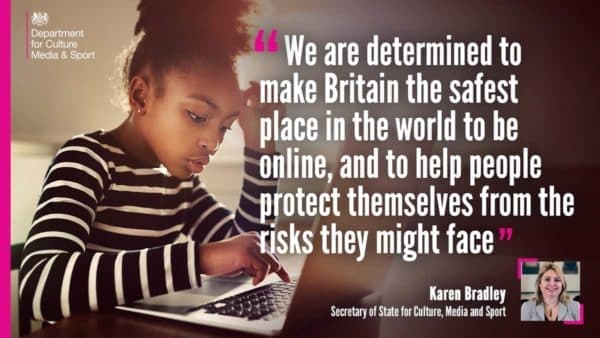Culture Secretary Karen Bradleyis leading the new cross-Government drive on behalf of the Prime Minister – with a green paper expected in the summer. The drive will ensure the UK becomes the safest place in the world for young people to go online.
UK to be safest place in the world for young people to go online
Parents now more concerned about their children sexting than drinking or smoking
A report has been commissioned to provide up to date evidence of how young people are using the internet, the dangers they face, and the gaps that exist in keeping them safe. Sonia Livingstone is leading this work together with Professor Julia Davidson and Dr Jo Bryce, on behalf of the UK’s Council for Child Internet Safety (UKCCIS) Evidence Group.
Ministers will also hold a series of roundtables in the coming weeks with social media companies, technology firms, young people, charities and mental health experts to examine online risks and how to tackle them.
What are the main priorities?
The work is expected to centre on four main priorities:
how to help young people help themselves
helping parents face up the dangers and discuss them with children
industry’s responsibilities to society
how technology can help provide solutions
The focus will be on preventing children and young people from harm online and making the internet a safer place.
The round tables are also expected to examine concerns around issues like trolling and other aggressive behaviour including rape threats against women.
They will involve ministers and officials from departments across Government including the Home Office, Department for Education, Department of Health and Ministry of Justice as part of a co-ordinated effort to make the internet safer.
How have risks to online dangers grown?
It comes amid growing fears that the threat from online dangers has grown far more quickly than society’s response to them, and worries that tech-savvy young people are being exposed to risks that their parents never were and might not know how to confront – like sexting, cyber bullying, and content which promotes self-harm, suicide and eating disorders.
78% of Parents more concerned about sexting
A recent poll found more parents were concerned about sexting than about their children drinking or smoking. The YouGov survey for the PSHE association showed 78% were either fairly or very concerned about sexting, compared to 69% who concerned about alcohol misuse and 67% who were concerned about smoking.
More than one in 10 young people say they have been the victim of cyberbullying, and self-harm among children is on the rise amid evidence of a link between internet use and an increased risk of self-harm.
Karen Bradley, Secretary of State for Culture Media and Sport, said:
“The internet has provided young people with amazing opportunities but has also introduced a host of new dangers which children and parents have never faced before.
“It is increasingly clear that some behaviours which are unacceptable offline are being tolerated or even encouraged online – sometimes with devastating consequences.
“We are determined to make Britain the safest place in the world to be online and to help people protect themselves from the risks they might face.
“To do that we want to understand the full scale of the problem and explore how everyone – including Government, social media companies, technology firms, parents and others – can play their part in tackling it.”





